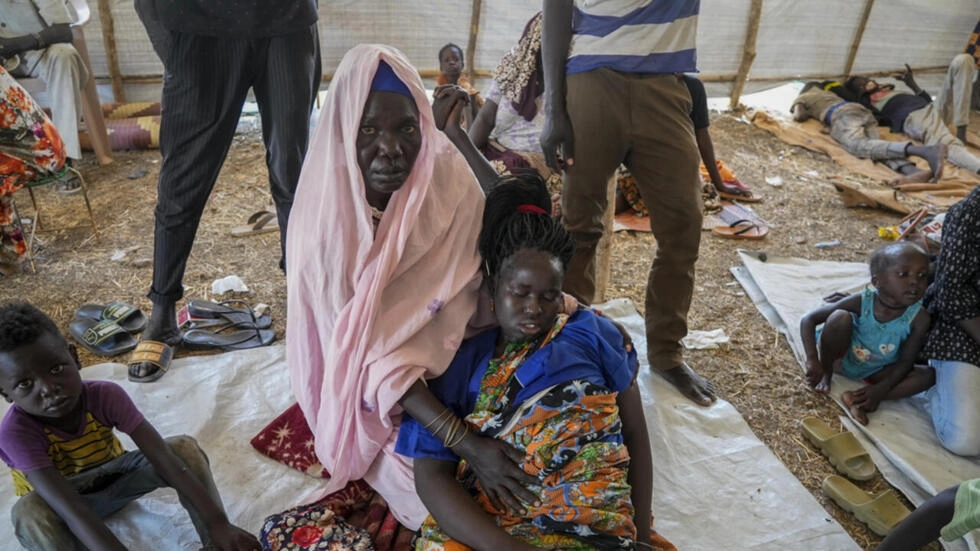Battles have been raging in Sudan’s war-torn capital of Khartoum since last Tuesday with no sign of the violence abating. Other regions are also experiencing prolonged battles, especially Darfur.
Witnesses described “the sound of heavy artillery fire” in northern Khartoum, and “clashes with various types of weapons” in south Khartoum.
In the city centre, at the confluence of the White Nile and Blue Nile rivers, the island of Tuti is also “under total siege” by RSF forces, residents said.
Paramilitaries have also blocked the only bridge to the island. Residents say they cannot move the sick or wounded to hospitals, and worry about looting or stores running out of food.
Dozens of women have reported attacks and even rape in their homes at the hands of military and paramilitary forces.
Ten people from the Democratic Republic of Congo were also killed last Sunday afternoon in an army attack on Khartoum’s International University of Africa.
The conflict has now entered its eighth week with fighting between the army chief Abdel Fattah al-Burhan and his former deputy Mohamed Hamdan Daglo, who commands the powerful paramilitary Rapid Support Forces (RSF).
Marina Peter, chair of the Sudan and South Sudan Forum, told RFI that “the conflict is only set to last at this stage. It was predictable as the belligerents crave power and have no respect for civilians.”
Since the fighting began on 15 April, more than 1,800 people have been killed, according to the Armed Conflict Location and Event Data Project.
In #Sudan the situation has been compounded by violence.
We urge all parties to resume ceasefire negotiations, stop the fighting, withdraw from health facilities, protect health workers and support the delivery of lifesaving supplies. pic.twitter.com/Az5SutChLN
— Tedros Adhanom Ghebreyesus (@DrTedros) June 4, 2023
War crimes in Darfur
Outside of the capital, the western region of Darfur has seen the worst of the fighting.
This week, fighting left at least 23 dead and dozens injured in the city of Kotom alone, according to a provisional count by the regional government. “It is difficult to know the real number of victims,” its spokesperson said.
Aid workers and journalists estimate that 2000 injured people have no access to medical care.
Mass rapes are again being reported in Darfur, according to the UN Women representative in Sudan, Adjaratou Ndiaye.
“In Darfur, the situation is even worse because it was never peaceful,” Sudan’s expert Marina Peter told RFI. “Now the militia are trying to arm everyone, and even medical facilities are being targeted.”
Fleeing for life
Most have been trying to flee.
The United Nations says that more than a million and a half people have now been displaced, within the country or across its borders. More than 425,000 people have fled to Chad, Egypt and South Sudan.
Some 25 million people, more than half the population, are now in need of aid and protection.
The International Federation of Red Cross and Red Crescent Societies (IFRC) has expressed deep worries on Tuesday.
“We face a massive humanitarian crisis that is only going to get worse with the collapse of the economy, one of their spokespersons said, a “collapse of the health care system.”
The identification and dignified burial of the deceased is a key pillar in humanitarian response. It helps families learn about the fate of their loved ones.
We are proud to support @SRCS_SD in doing this vital exercise.https://t.co/64tTPOvNyy
— ICRC Sudan (@ICRC_Sudan) May 30, 2023
There’s an urgent need for a massive injection of funds, according to the IFRC. The UN has also appealed for financing, as the fighting shows no signs of abating.
Washington slapped sanctions on the two warring generals last week, blaming both sides for the “appalling bloodshed” after the US- and Saudi-brokered truce collapsed.
The Sudanese army pulled out of ceasefire talks altogether.
The US Secretary of State Antony Blinken wants to convince them to commit to new talks, during his visit to Saudi Arabia this week.

